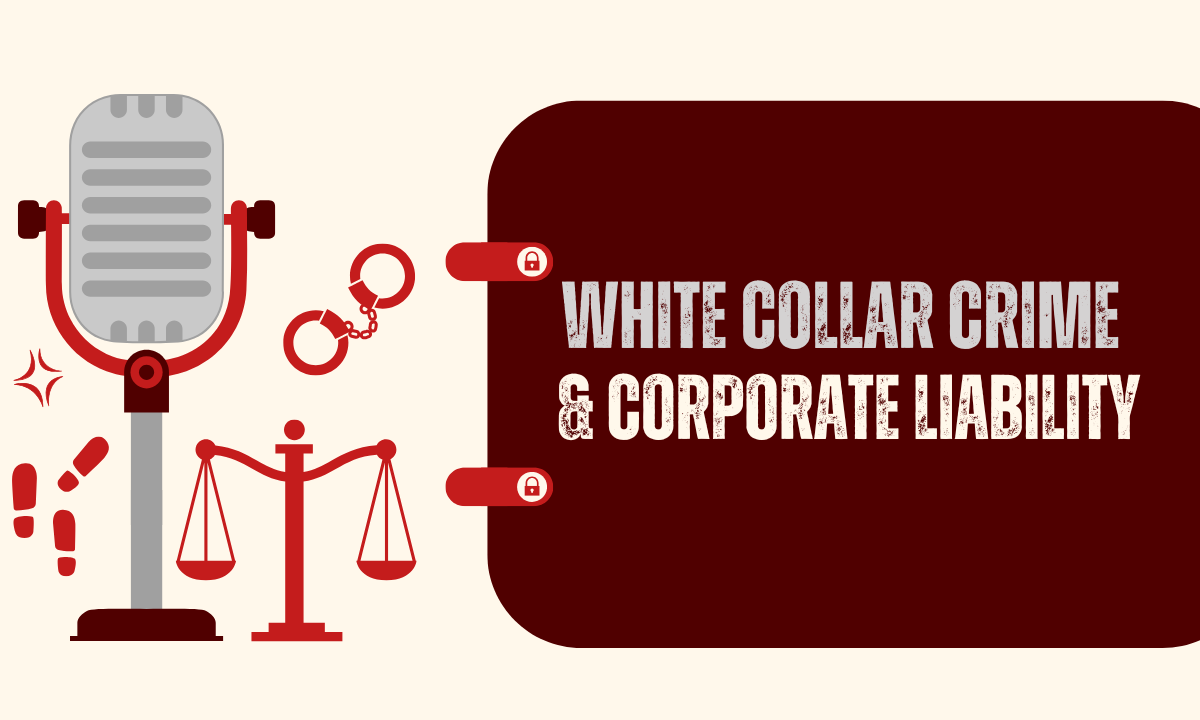+91 9990898327
Office : 632, Dr. Mukherjee Nagar, Delhi 110009
Mon-Sun: 09:00AM - 08:00PM

In the year 1939, Socialist Edwin Sutherland firstly coined the term ‘White Collar Crime’. According to Edwin Sutherland ‘White Collar Crimes’ committed by people of high social status during the course of their occupation. Basically these crimes refer to non-violent, illegal activities that are committed by individuals, businesses and even government organizations for financial or personal gain. There are some types of white collar crimes namely fraud, Insider trading, Ponzi, Embezzlement, etc. Generally there are two broad categories of White-collar crime (i) Individual crimes and (ii) Corporate crimes. Individual crimes are financial crimes committed by an individual or a group of individuals like hacking, Ponzi scheme, etc. Corporate crimes occur on corporate level like insider trading.
Corporate crime is a type of white collar crime. Specifically, corporate crime is considered the type of crime which occurs in the course of an occupation in the context of crimes committed by companies or their agents against members of public, environment, creditors, corporate competitors or investors for the benefit of the company in contrast to the individual’s benefit alone. There are some types of corporate crimes are tax fraud, companies and security offences, occupational health and safety, environmental offences, consumers affairs, false advertising, restrictive trade practices, etc.
There is slight distinction between Blue-collar crime as this crime committed by individuals of the lower socio-economic class, such as blue-collar workers like drug offences, assaults, murder sexual assault, etc. On the other hand white-collar crimes committed by individuals or by corporates from a higher socio-economic class. White collar crime refers to financially-motivated, non-violent crime and covers a broad range of criminal behavior. Blue-collar crimes are also generally easy to detect and less complex than white-collar crimes. This is because, generally, white-collar crimes are more complex, premeditated and better planned out crimes.
Now the question arose that what is the nature of white collar crimes? So, to answer the question is that generally the white collar crimes are criminal in nature. It may be civil in case of freezing assets of people.
The fundamental principle of Corporate criminal liability is based on the Latin proverb “actus non-facitreum, inconclusive mens sit rea” which states that to hold someone accountable, it must be proven that their action was unlawful and motivated by guilt.
The actions are derived from the actions of an individual employed by the company. Because the offender is connected to the organization, the organization is held accountable or the individual who works for the organization.
This model talks about the environment in an organization that encourages the commission of crime. The corporate culture which leads to crime comes under this model. A corporation as an artificial person is not capable of committing a crime but the culture of the organization can be conducive to committing a criminal act. Corporations in this case would be considered as having the required mens rea for committing a crime.
This doctrine also implies that the act done should be within the limit and scope of employment. According to this doctrine, managers and directors have accountability for the company’s actions, which are defined as their actions as well.
So, to conclude this we can say that Corporations have become an integral part of our society and due to new technological development corporates holds a strong influence on our daily lives. Corporate crimes have a great impact on Individuals, society, and the environment than conventional crime. The criminal liability of corporates has grown slowly in common law jurisdictions as compared to civil law countries. Corporate bodies in India are subject to criminal prosecution for several offenses under the Bhartiya Nyaya Sanhita (BNS) and other specific laws like the Prevention of Corruption Act and the Prohibition of Benami Property Transaction Act.
Post a comment